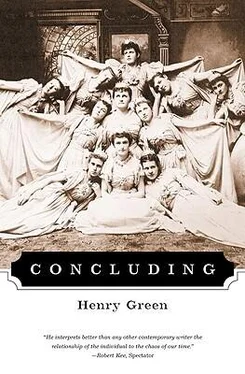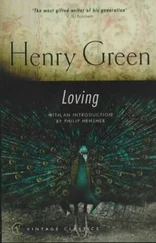"Oh no, Miss Marchbanks," the girl said, which somehow came as a comfort to both.
"Well then, matters must be all right," the woman said brightly. "So there's nothing you feel you can't tell me?"
Merode was mopping her nose by now. But she kept silent. "You see, my dear," the older woman went on, to bridge the silence, "you are putting me into such an awkward predicament. You're no longer a child," she said, disbelieving this. "You know as well as anyone that I must go by rules just the way you have to. And the regulations I'm under are simply this. That when one of the girls we're in charge of doesn't tell the truth after she's broken her word, we mustn't even question her, and we're bound to report it. And I have to make out a report which must go right away, straight up to the State Board in Government Centre, nothing can stop that. To do so would be an offence," she ended virtuously, and took a good look at the child. Merode was staring, with a completely blank expression, at the dado painted to resemble Roman pavements in perspective, "Then I don't have to tell you the view they'll take up there of a serious thing like this, Merode."
"But Miss Marchbanks, what have I done?" the girl burst out.
"Now are you being frank with me, dear? You're not a baby.
Indeed, after all, you're practically a grown woman, that's just the whole trouble. Because you must see you can't be allowed to career about outside, at dead of night, and in our pyjamas."
The girl said not a word, kept her face averted. Miss Marchbanks decided what she didn't like was her not meeting one in the eye. "Besides," she tried once more, "there's the two of you. Mary isn't back yet, you know."
The child, she thought, seemed to turn to stone whenever Mary's name was mentioned. But now that they had the one uncovered, the other could hardly be far away. Yet there was Edge's parting shot. "Safety in numbers, Marchbanks," she had said. And "if it was only the one I would telephone Headquarters at once with her description."
"Think it over, Merode." The older woman had again suddenly decided there could be nothing terrible, that everything would be all right. Almost as though the child sensed this she at once rose to leave the room.
"No, sit down, dear, I haven't quite finished," Marchbanks said. "What were you up to? Tell me."
"I don't know, ma'am."
"Now really, Merode, I shall get quite cross in a moment."
"It was nothing, ma'am, really."
"You'll let me be best judge, if you please," Marchbanks said. There was no response.
"Come now. Did you go out with a boy?"
"Oh no, Miss Marchbanks." This, at least, sounded genuine to the older woman.
"Did you try to meet someone else, then?" No answer.
"In other words it's simply, Merode, that you won't tell. Isn't it?"
But the girl had come to be mesmerised by the black and white receding pavements. No longer blinded in sunlight her eyes had caught on one of the black squares, as that pyjama leg had earlier been hooked on a briar. And while her horror at this interview increased, so the dado began to swell and then recede, only to grow at once even larger, the square in particular to get bigger and bigger till she felt she had it in her mouth, a stifling furry rectangle. Then, when she managed to shake herself free, she cleared it out, but only for a minute. After which this process began all over again.
"Do think," Marchbanks was saying. "My dear, your whole future is at stake. If you set out with such a mark against you, things being as they are these days, when you leave here you'll just have a job on the machines," she said, speaking the brutal truth. "Because you should realise I can't help myself," she ended by falsely admitting. "I'll do all I can, of course. But, as you must get into your head before it's too late, there's Miss Edge and Miss Baker. Oh well, if you really want to know, I'm most afraid of Miss Edge."
Merode could hardly take this in, trapped, as she now was, by one of the more frightening periods of the dado, that immediately before the black square would begin to swell, when the whole stretch was beginning to billow, as if the painted pavement was carried out on canvas which had started to heave under a rhythmically controlled impulse actuated from behind.
"Was it a boy?" Miss Marchbanks demanded, her confidence about to evaporate. Then she thought of the child's mother and father. For she had known this come off when all else failed.
"I must wire your parents," she said, as she got up to go over to the file, and hated herself for playing the ace. But after all, she thought, I've my own position, my pension to consider.
"Why, you're an orphan," she cried out, delighted because she knew this would make a great difference with Baker, who had long been an acknowledged authority in State circles on the parentless. "And made your own way with scholarships, I see here. My dear child, you don't want to throw all that away on a simple escapade." Merode had got her eyes off the dado and was better for the moment. She did not want her aunt brought into this.
"But what is it you wish me to tell you, Miss Marchbanks?" she mumbled.
The lady sighed. "You're surely not expecting me to put the words into your mouth," she said.
"You've always been so wonderful to us, Miss Marchbanks."
"You're rather a flatterer you know, Merode."
"A lot of us call you mother, ma'am." She began to cry again.
"Ma, you mean, which is quite different. Now, come on now, we haven't got all morning. And you want to go to the dance tonight, don't you? It's going to look so lovely, really it is, especially if I can work in a pet idea of mine about fir trees. Adams is to fetch some. Was it a boy?"
Marchbanks saw the girl had ceased crying. At this sudden return to the main object, the child's attention had been forced back to that dado, although at first the squares stayed as they were. What's the use? Merode asked herself. Let them tell it.
"I suppose," she said at last. Miss Marchbanks went back and sat down behind Edge's desk. She allowed herself a small, satisfied smile.
"Was it Mr Birt, by any chance?"
"I don't imagine," the girl answered, obviously in a daze.
"Or Mr Rock?"
No answer.
"Was it?"
The furry square on her tongue started to swell once more.
"I'd like to help you but you won't let me," the woman said. Merode began to cry again. This cut her off from the growing dado, but the rectangle was black with stiff hairs on her tongue.
"Listen dear," Ma Marchbanks said, as a trace of the child's panic passed over her. "You were only sleep walking, weren't you? That's all, isn't that it? So simple, you understand. It must be? Can you hear?"
There seemed to be some lessening in Merode's sobs.
"But where is Mary, then?" Marchbanks insisted in a great voice, upon which Merode slumped forward in a faint. As she rang the bell on the desk for Miss Birks, and started up out of her chair, Ma Marchbanks thought, oh dear, to faint right away while I was questioning, how will that look, oh dear, but the poor child.
Mr Rock went out with the bran to summon Ted, his goose. It was unusual for the bird not to be at hand, waiting.
"Ted," he called, "Ted," in exactly the swill man's voice he had used to announce his presence in the kitchen, only louder. He turned this way and that, but there was no sign. Then he saw a sergeant of police push his bicycle onto the path from the road. The blue uniform gave Mr Rock a jolt. Already, he asked himself, so soon?
The old man's cottage stood, like the hub of a wheel, on a spot at which several rides met. As he watched the policeman he saw, out of the corner of an eye, his goose come in a rush, absurd sight, its neck outstretched, wings violently beating to help cover the ground it had never left. Sun now made the bird a blaze of white.
Читать дальше












